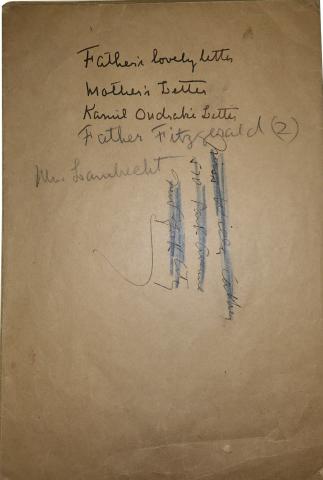
Annotations From the Archives: Fan Mail
Our archives are home to not only Willa Cather’s letters, but to many of the letters that she received from her fans! Running the gamut from high school students to state politicians, Cather’s readers wrote to share their love for her writing and, often, the personal connections they felt to the subject matter. Cather herself saved many of these letters, sharing them with friends and family when she found them inspiring or her correspondents particularly interesting. Read alongside Cather’s own letters, they provide a glimpse of an author who was both self-assured in her work and eager to hear from readers who really understood it.
One of Cather’s earliest letters from a reader must surely have come from fellow Nebraskan and author Kate McPhelim Cleary, though delivered indirectly. Cleary, who in 1884 moved to Hubbell, Nebraska, where she and her family struggled to survive, was the author of hundreds of stories and poems, the proceeds of which helped to keep the family afloat until Cleary’s physical and mental health deteriorated. Cleary’s letter to Cather via McClure’s Magazine, though not yet found, must have praised Cather’s recent publication of “The Sculptor’s Funeral” in the January issue of McClure’s. Cather was buoyed by Cleary’s affirmation that her depiction of the West was not exaggerated, as some critics had claimed. “It gives me a very genuine pleasure to know that the story has rung true to someone besides myself . . . . Anyone who has lived in one of those little Western towns must, I think, have a very keen and definite feeling about it, but it is almost hopeless to try to communicate it to anyone who has not had that experience.”
Samuel McKelvie, who served as Nebraska governor from 1919 to 1923, also recognized Cather’s knack for aptly recording the experiences of central Nebraska. McKelvie was born in Fairfield, Nebraska, in 1881, just 45 miles from Red Cloud. After college, he too worked in publishing, albeit in Omaha for Nebraska Farmer, the first and one of the most influential agricultural publications in the state. “I am not a very extensive reader of fiction,” McKelvie admitted in his 1921 letter, “but when I got into your book- “My Antonia” [sic] - it so interested me that I stayed up half the night reading it.”
Cather saved many letters from soldiers after the publication of One of Ours in 1922. Her close personal connection to the people who inspired that story—particularly her Aunt Franc (Frances Smith Cather) who had just died in April of that year—may have influenced her decision to keep many of them. Cather had again received critical reviews over some portions of the book, especially its depictions of World War I; one letter in particular, from bookseller Charles Bayly, Jr., was especially welcome, coming as it had just after publication. “If the book is making enemies . . .” he writes, “you may be sure that they are few. One of Ours is one of those joys of a bookseller, a really splendid book which can be sold to any customer.” Bayly expressed his pleasure at selling the book because he had served in France with the Ambulance Service of the American Expeditionary Forces and the French Foreign Legion for three years and, in his opinion, “One of Ours is the most perfect picture of the war that I have read.” Another letter from Kirk Bryan probes deeper questions: “Those who died in action are lucky, but what of us whom military fortune gave good safe jobs & who have also the bitterness of knowing that better men are buried in France? How shall we carry on in a peace that is bunk?”
Many letters came from complete strangers, of course, but at other times, friends thought to include notes about Cather’s writing too, sometimes in the midst of letters that seemed otherwise unrelated. Following Mary Virginia Cather's funeral in 1931—which Cather did not attend—lifelong friend Mary Miner Creighton wrote a heartfelt letter to Cather, sharing details of her mother’s service and burial. At the end of the letter, though, she writes, “I must tell you I love Shadows on the Rock. What a wonderful thing it must have been to have written it.” This seems like a non sequitur unless you realize that Cather shared that novel, prior to its publication, with her mother while she was hospitalized in California.
Our collections also contain a sampling of Willa Cather’s own filing system. She kept certain letters, filing them in a system of envelopes by subject matter or correspondent. In fact, this system of envelopes notes at least one letter, from Webster County Czech immigrant painter Kamil Ondrak, that has not yet been found but may represent a closer acquaintance between the author and the well-respected decorator and artist than was previously realized.
To use the incoming correspondence of Willa Cather or other items from our collections in your research, please contact archivist Tracy Sanford Tucker. Researchers may schedule in-person appointments to work with our collections or request digital access to materials by contacting her at ttucker@willacather.org.
Sources:
Collections at the National Willa Cather Center in Red Cloud, including:
WCPM Manuscript Collection
Gene and Connie Koepke Collection
Southwick Family Collection
Elizabeth A. Shannon Collection
Kate M. Cleary: a Literary Biography with Selected Works, by Susanne George-Bloomfield
